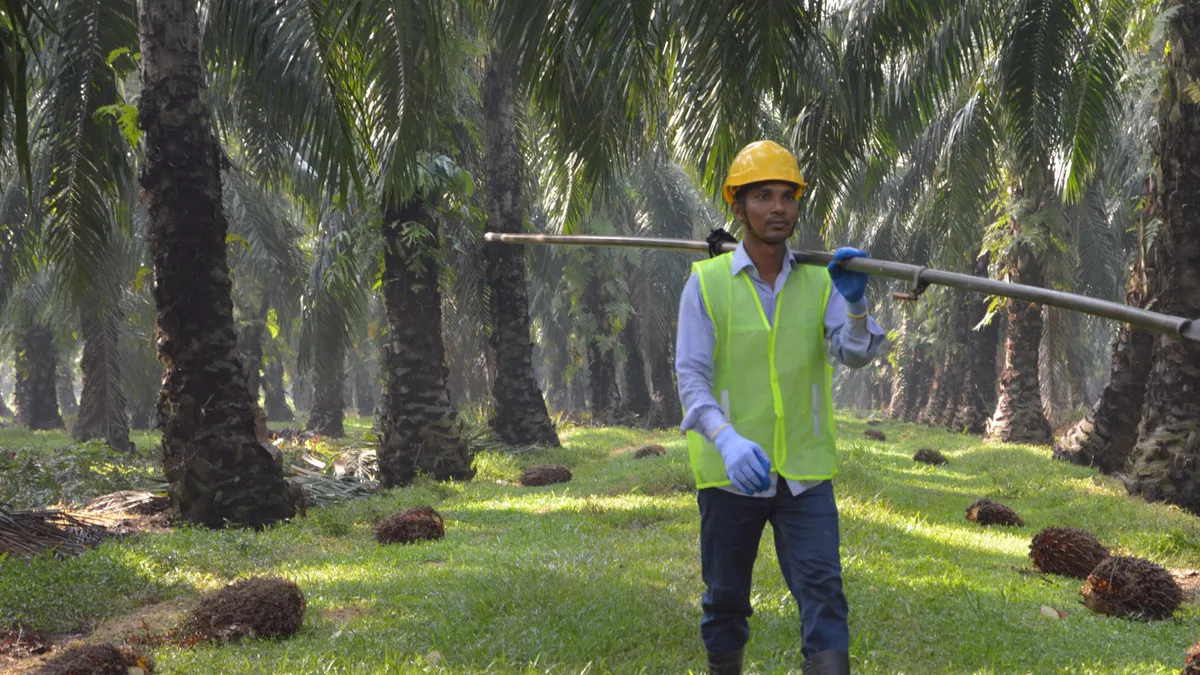After more than a decade of work intended to rid palm oil supply chains of deforestation, the results don’t match the effort.
Deforestation has increased, despite more monitoring, more certifications, more on-the-ground cooperation and the availability of palm oil certified by the Roundtable on Sustainable Palm Oil for 12 years.
Global land cover decreased from 2000 to 2015, according to The United Nations Sustainable Development Goals Report for 2019. Forest area as a share of total land is still declining, but the rate of decline is slowing, according to the UN. Indonesia, the top global palm oil producer, experienced the third-most forest loss in the world in 2019, according to the World Resources Institute — though it does represent an improvement from previous years.
Companies that depend on ingredients at the center of these stats, namely palm, soy, cattle and wood, have to reckon with the fact that their individual actions to date are not enough to substantially shift the macro trend.
A 'drastic' approach to close the gap
Nestlé and Proctor & Gamble knew in 2019 they would not meet their sustainable palm oil goals in 2020. CDP declared in November 2019 that the Consumer Goods Forum would not meet its goal of zero deforestation in palm oil supply chains by 2020. And Mars was "going through all the right motions" of meeting 100% RSPO standards and mapping its palm mills but without results, Alastair Child, global vice president of sustainability for Mars Wrigley, said via email.
CDP described a "growing gap between companies' ambitions and targets."
Mars' awareness of that gap drove the latest and perhaps most novel approach to reducing the amount of deforestation that occurs in the palm oil supply chain.
In October, Mars pledged to reduce the number of palm oil mills it works with from more than 1,500 to under 100 by the end of 2020, and down to 50 mills by 2022.

"Through our process of simplification, we're focusing on awarding longer-term contracts and building closer partnerships with the suppliers that are remaining in our supply chain," a Mars spokesperson said via email at the time of the announcement.
Cutting suppliers for violating deforestation policies is not new, Daniel Strechay, global director of outreach and engagement for RSPO, said. Hand picking a small list of mills to partner with is.
Mars' move, and others like it that may follow, supports the most advanced, transparent suppliers and eschews the rest. Working with fewer suppliers makes keeping to its strict standards simpler for Mars, but it also means that it holds sway with fewer mills and therefore farms.
"Anytime you pull out ... and there's no longer the option to do business with you, you lose a little bit of leverage to be that driver for positive change," Strechay said. "What you want to do is to stay engaged, or at least for the organization to have the opportunity to source to you in the future," he said of suppliers cut off in streamlining efforts like Mars'.
"Simplifying supply chains for global customers is not going to clean up the commodities trade. It's like trying to fix a leaky faucet in a burning building."

Diana Ruiz
Senior palm oil campaigner, Greenpeace USA
Mars says it does have a plan to maintain influence in producing regions.
"We don't stop at our own direct supply chain," Child said.
Mars says it is continuing work with smallholder farmers to transition to sustainable practices and working with local governments, NGOs and other buyers to further local initiatives on the ground in producing countries.
Clarisse Chang, operations manager and senior sustainability analyst at EcoVadis, called the move "drastic," adding that Mars was clearly trying to be a leader in the space. But as Mars is the first major purchaser to streamline its supply chain in this way, the macro outcome is unknown.
And Diana Ruiz, Greenpeace USA senior palm oil campaigner, is uncertain Mars' move to reduce suppliers will bring large-scale results in the palm oil market.
"Simplifying supply chains for global customers is not going to clean up the commodities trade. It's like trying to fix a leaky faucet in a burning building," Ruiz said in a statement reacting to the news in October. The way to bring about change, according to Ruiz, is to source only from "clean" suppliers and reduce overall buying volume.
The scale of Mars' palm oil purchasing will remain the same as it reduces mills in its network. Mars is roughly the 22nd largest purchaser of palm oil in the world, according to the World Wildlife Fund.
The road to fewer suppliers
Mars' "radical simplification" strategy, as Child called it, is the result of two years of thought, following the realization the company needed to take a clean-slate approach to palm oil.
"It became clear that buying anonymous commodities through complex supply chains with a sole reliance on certification would not suffice to effectively address deforestation," Child said.
The suppliers Mars sticks with will be those "who can commit to Mars' environmental, social and ethical expectations, and commit to driving positive improvements throughout their extended supply chains — and they must have the infrastructure and capacity to do so," he said.
"It became clear that buying anonymous commodities through complex supply chains with a sole reliance on certification would not suffice to effectively address deforestation."

Alastair Child
Global Vice President of Sustainability, Mars Wrigley
Mills that can provide full transparency into their own tiers and facilitate Mars' methods of mapping and monitoring will stay. Those that can meet these standards will be rewarded with long-term contracts, according to the company.
"We talk about vendor consolidation a lot," said Jessica Kirshenblat-Gooderham, customer success team leader for sustainable procurement at EcoVadis. It's a tactic across sustainability and ethical supply goals to make complex supply chains easier to manage.
With a short list of approved suppliers, Mars is confident it will have a deforestation-free supply chain long-term.
Shifts in the palm oil supply base
The status afforded to the suppliers of a major global palm sourcing organization is a powerful force in the field, said Strechay.
"People want to work with the best of the best. And they want to work with large organizations that have footprints across the globe, because other organizations see them, working with them doing business with them, and that helps them reputationally," he said.
Suppliers who make Mars' elite list will likely gain status, and business, because of it.
But what about the hundreds of suppliers it will no longer purchase from? How would moves like Mars' at greater scale affect palm-producing regions and the remainder of the overall palm oil supply?
"Radical simplification" could also leave hundreds of suppliers without ample reason to improve if the practice spreads to other sourcing organizations.
"There's two sides of the coin. Do you continue to engage with other suppliers and try to get them up to your standards, while you have leverage? Or do you work from outside?" Strechay asked.

A similar but less dramatic shift at work among other palm oil buyers may offer some context. Some deforestation-conscious brands are slowly moving away from what’s called "mass balance" purchasing to a segregated deforestation-free supply.
Mass balance is the term used when deforestation-free palm oil is physically mixed with conventional palm oil. The sellers know the percentage of each type but mix them together and charge a rate based on the percentage. When deforestation-free palm oil is kept physically separate from conventional and processed in certified mills, it's called segregated supply.
Mass balance purchasing, intended to make space for infrastructure development, can allow a brand to display certifications to the consumer without converting to 100% segregated supply. "There’s good evidence … that smallholders rely on the mass balance supply chain," said Strechay.
The suppliers of segregated palm oil tend to have more mature businesses than those participating in the mass balance markets. It could be concluded that the market is moving away from the most vulnerable farmers, but Strechay said this isn't the case, yet.
"I wouldn't call it disruptive at this point, because we do have an abundance of material that's going unsold as certified sustainable palm oil. So we actually have a need for greater uptake," he said of the segregated supply chains. "I'm not worried about that just yet. I think that would be a good problem for us to have."
This story was first published in our weekly newsletter, Supply Chain Dive: Procurement. Sign up here.























